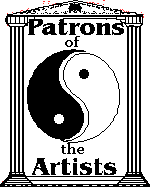

This is an intentionally broad explaination of the system as a whole. This page appears as well on Nowhere Radio where the Patrons of the Artist system is being hosted and launched, not just for me, but to serve any artists who wants to participate. For a more personal explaination of how I plan to use the system, see my artist's page at Nowhere Radio or my personal invitation to become a Patron of the Artist here on the website.
Throughout history and likely well before it, in every culture in the world the human race has respected and supported their artists. Historically, much of the great art we revere was often the direct result of the support of a patron, or patrons, of that artist.
When the selling of a product took precedence over all other things, including culture, music became something to be sold as well. Before recording and mass-reproduction technology became available, live musicians and live music were still a nescessity. But with the ability to record and mass-produce copies of recordings, business found it much more profitable to sell millions of mass-produced units by fewer artists. The end result is the present situation, where a few massive corporations produce and sell as many unitsas possible from the least number of artists possible, to maximize their profits. Their goal is not to encourage artists, but to discourage and eliminate as many as possible, to focus the pubic's attention on the few remaining artists, thus selling the maximum number of mass-produced identical units. The channels for all mediums of expression grow narrower and narrower, focused on less and less variety of content produced by a smaller and smaller pool of talent. The fate of artists, art, culture, and the people was, and still is, of no concern. The result is that almost all the talented artists born into the modern world have no chance of being heard, and no chance of making even a basic living from their music, and must instead focus their energies on other things, like survival, or do without the things like homes, families, food, etc; that most of us take for granted. While the people end up paying a lot for very little, a small amount of which enriches (sometimes) the few most ambitious and competitive artists (to the point where talent isn't near as important as "other skills") while the bulk of the profit still goes to a few huge corporations owned by a very small percentage of the people.
There has been a lot of talk about what to do about this situation. We have decided to try returning to the roots and traditions, since not all traditions are wrong, like playing music, dancing, singing, and rubbing pretty colors on the walls in realistic or symbolic shapes! Hey, its ok, we're serious, but not too serious!
Originally, the people supported the actually small percentage of artists among them. This continued through history. However, as individuals accumulated wealth and power, an artist's support was often derived from aquiring wealthy patrons, though one might say that their wealth, and thus the artist's support, was still derived from the people, if not always voluntarily! What we propose is evolve this tradition with the spirit of democracy, populism, and diversity. "Patrons of the Artists" depends upon the small but cummulative support of many individual people instead of a single wealthy individual. It is essentially a system where the people can directly support the artists of their choice, be their patrons, and thus allow artists, art, and the people to finally excaping the narrow concepts and exclusive corporate monopoly of supporting an atist by purchasing a commercial mass-market "product". The principles and process are quite simple:
In principle, the patrons are directly supporting the artist, because it is the artist that produces the art, and not all art can be conveniently packaged into a standard product. Even when it can, there is often so much more to being an artist than just making a product. There also is the direct personal relationship between the artist and the people who support them, rather than purchasing a anonymous product often disconnected from any real connection to the artist. It is a system that recognizes the age old symbiosis where the community supports its artists and the artists contribute their art to the community, and both are better off, and neither can exist without the other. Patrons aren't buying a product, they are supporting the artist, and the creation of art, whatever they do... performing, recording, having a life. It's up to the Patron, and the artist, to define and chose what this means.
This system recognizes that being an artist is more than making CDs, or performing, or in general making a marketable product. It recognizes that buying CDs is really supposed to be about supporting artists, even if it now mostly supports big corporations using artists. It is a system that lets the people chose to patronize and support the artists of their choice, and give artists a secure means of focusing on their art, and producing a steady stream of it for their patrons and the world. The ones left out in this scheme are, you're right, the big corporate "record companies".
In general practice, patrons subscribe to the artists of their choice on an annual basis, and the artists provide their patrons with something their patrons feel is worth supporting, so they decide to keep renewing their support. The details of what each artist provides is up to that artist, and whether what an artist has to offer is worth supporting is up to each person who choses to patronize artists, by patronizing the artists of their choice. It is fluid, and supportive of both diversity, working as well for even an artist on "the far fringe" who only appeals to a small percentage of the people, as for the artist who can appeal to a great number of fans.
In the simplest scenario, and artist can produce a recording each year and send it to their patrons in the mail. Artists freed of the need to wait tables and able to focus on their music, and also needing to please their supporters, could possible produce a couple recordings a year, or video, or anything their patrons want. But again, the artist is not focusing on a product to mass market but to please their supporters, who are supporting the artist because they like what the artist produces, encouraging the artist to pursue their art, not some marketability. The patrons are also supporting an artist, not just buying a product where a trickle of the proceeds may support the artist they enjoy.
This is a very flexible and powerful system. For examples, one artist might produce no recordings or actual "product", doing nothing but free shows in children's hospitals and orphanages, and still attract enough patrons to support their work, patrons who feel that supporting this work is enough. At the same time, if an artist doesn't do something to keep their patron's support, they will lose it when renewal time comes.
The system therefore stresses the connection between the artist and their supporters by creating a direct link. The focus is not on a product and marketing hype, but on the artist themselves, as a real person, and a real artist, not an "image". One of the pillars of the system is the artist connecting and communicating with the people who sincerely appreciate their efforts and art, which also actually means a lot to an artist, another kind of support as important as money. Also, there is the ability for the artist to get feedback from people who actually appreciate their art, a responsive audience. Yet it is also a system designed to give an artist's fans the means of getting a steady stream of content, some sort of valuable art, delivered to their door.
Because there are no "middle men" profiteering on the traditional exchange between artist and community, a relatively few patrons could support an artist, which means that the people as a whole could support a great number and wide variety of artists, not just those who fit the mold of mass "pop-star" marketing. An artist who only appealed to a tiny fraction of the people, could still attract enough patrons to allow them to produce a steady progression of recordings. Even an artist who couldn't attract enough patrons to be fully supported, would at least be subsidized, which could easily be enough to make the difference between giving up and continuing their art. It is also a system which doesn't promote a mentality of overnight success, riches, and retirement; but a steady income for artists who keep up a steady effort that satisfies their patrons. This is no free ride, artists are expected to work, but at their art, to keep the support of their patrons, year after year.
At a subscription rate of (for example) $20 a year, not much more than the cost of a CD or a magazine, and much less than a lot of things, an artist could survive with the support of only a thousand people. They could produce a CD and support their art with the support of only a hundred. Even those whose art only appeals to a very small percentage of the population could attract these type of numbers if they can make the initial contact to that small percentage. These people would actually be responsible for enabling their artist to focus on their art, which potentially might reach a much greater number of people. An artist might be able to slowly build a secure support for their art on this foundation.
We have banded together here in Nowhere (does that make sense?). Each artist in our community here is on their own, to create their own relationship with their own patrons, to decide what they have to offer in return for their patron's support, and even more, their continued support. Our intentions in working together are both for effeciency in the mechanisms behind the system, and also to form a united front to promote this new economic model. This is a non-competitive system that focuses on the diversity of the public's tastaes, not a mainstream pop norm (though we can accept that too). It can support any number of and variety of individual artists, enabling them to develop and continue their art in an atmosphere of appreciation, and economic security and stability. Creating a centralized portal will make it easier for artists to adopt this system using our experience and structure. A central portal makes it easier for people who appreciate this system to find artists they wish to patronize, and introduce others to the patronage system.

and of course, the greatest of thanks to our host, where would we be if we couldn't be Nowhere?
When the independent artists, and the people,
in search of an alternative to the mainstream corporate "processed musical product"
finally found they had nowhere to go and nowhere to turn, they turned to

